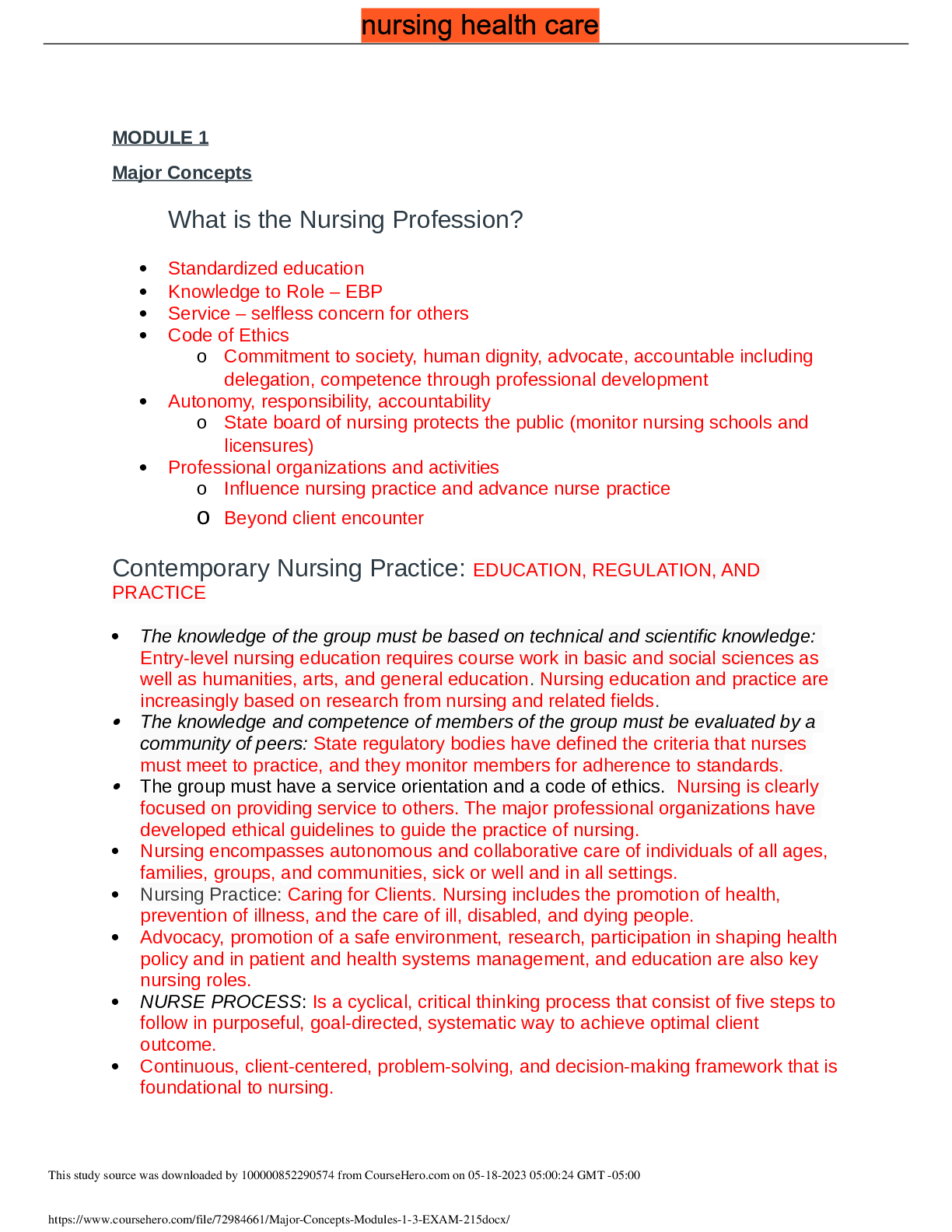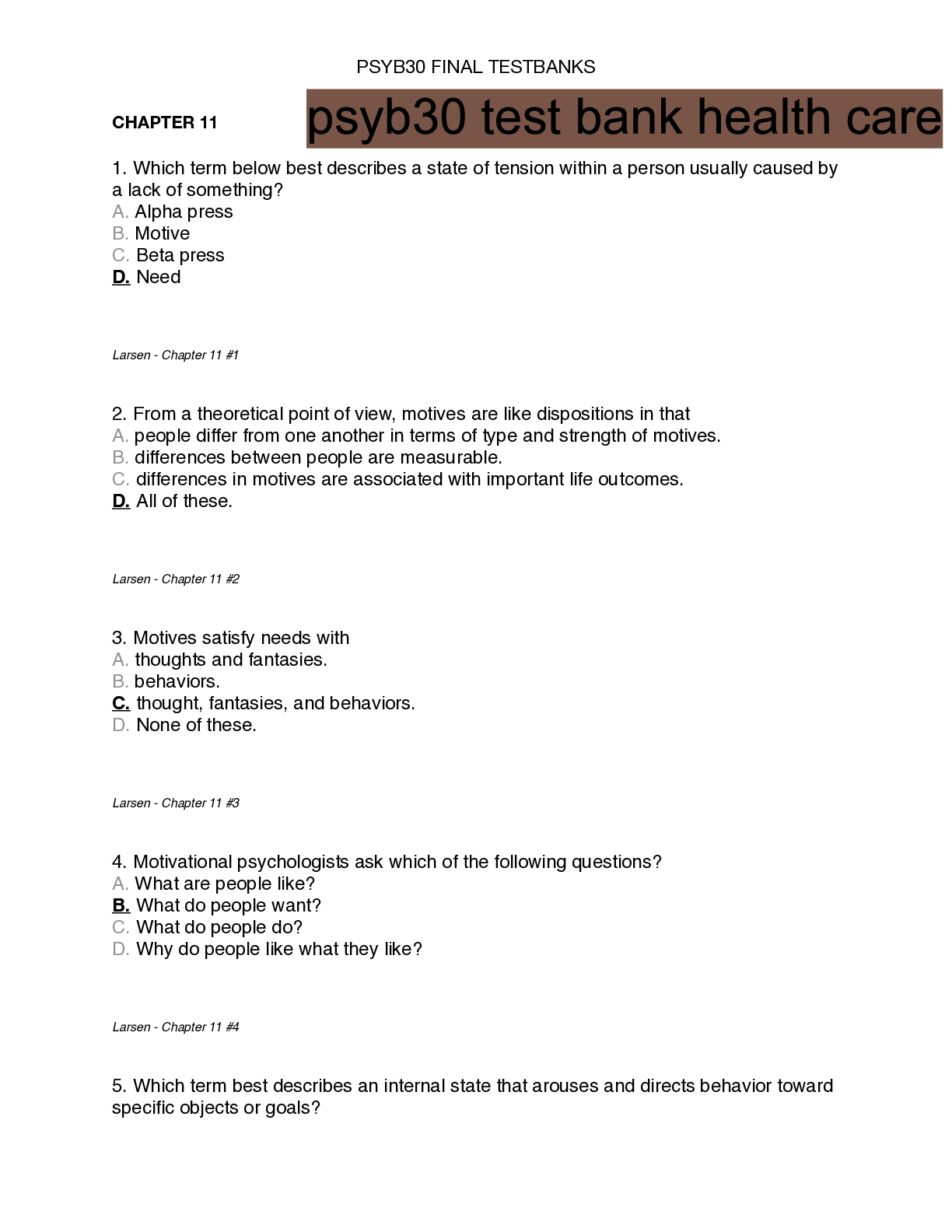*NURSING > QUESTIONS & ANSWERS > NURSING NUR 215 Major Concepts Modules 1-3 EXAM (215) (All)
NURSING NUR 215 Major Concepts Modules 1-3 EXAM (215)
Document Content and Description Below
What is the Nursing Profession? Standardized education Knowledge to Role – EBP Service – selfless concern for others Code of Ethics o Commitment to society, human dignity, adv... ocate, accountable including delegation, competence through professional development Autonomy, responsibility, accountability o State board of nursing protects the public (monitor nursing schools and licensures) Professional organizations and activities o Influence nursing practice and advance nurse practice o Beyond client encounter Contemporary Nursing Practice: EDUCATION, REGULATION, AND PRACTICE The knowledge of the group must be based on technical and scientific knowledge: Entry-level nursing education requires course work in basic and social sciences as well as humanities, arts, and general education. Nursing education and practice are increasingly based on research from nursing and related fields. The knowledge and competence of members of the group must be evaluated by a community of peers: State regulatory bodies have defined the criteria that nurses must meet to practice, and they monitor members for adherence to standards. The group must have a service orientation and a code of ethics. Nursing is clearly focused on providing service to others. The major professional organizations have developed ethical guidelines to guide the practice of nursing. Nursing encompasses autonomous and collaborative care of individuals of all ages, families, groups, and communities, sick or well and in all settings. Nursing Practice: Caring for Clients. Nursing includes the promotion of health, prevention of illness, and the care of ill, disabled, and dying people. Advocacy, promotion of a safe environment, research, participation in shaping health policy and in patient and health systems management, and education are also key nursing roles. NURSE PROCESS: Is a cyclical, critical thinking process that consist of five steps to follow in purposeful, goal-directed, systematic way to achieve optimal client outcome. Continuous, client-centered, problem-solving, and decision-making framework that is foundational to nursing. This study source was downloaded by 100000852290574 from CourseHero.com on 05-18-2023 05:00:24 GMT -05:00 https://www.coursehero.com/file/72984661/Major-Concepts-Modules-1-3-EXAM-215docx/ Nursing Process provides a framework throughout which nurses can apply knowledge, experience, judgment, and skills, as well as established standards of nursing practice to formulation of a plan of nursing. Parts of the framework are ASSESSMENT/DATA COLLECTION, ANALYSIS/DATA COLLECTION, PLANNING, IMPLEMETION, EVALUATION. (ADPIE) Assessment: The first phase of the nursing process—the data-gathering stage—is assessment. Multiple sources. You will obtain information from many sources: the client via history or physical examination, the client record, other health professionals, the client’s family or support system, and the professional literature. Purpose of assessment. You will use the data that you gather to draw conclusions about the client’s health status. Dx/Analysis: Nurses use critical thinking skills to identify clients’ health statuses or problem(s), interpret or monitor the collected database, reach an appropriate nurse judgement about health status and coping mechanisms, and provide direction for nursing. Nursing diagnoses reflect the client’s responses to actual or potential health problems and are different from medical diagnoses. Planning (outcomes and Invention): Goal-directed/ client-centered. Smart goals: Specific, Measurable, Tangible, Reasonable, Time Bound. In the planning outcomes step, you work with the client to decide goals for client care—that is, the client outcomes (or changes) you want to achieve through your nursing activities. These outcomes will drive your choice of interventions. Planning interventions phase, you develop a list of possible interventions based on your nursing knowledge and then choose those most likely to help the client to achieve the stated goals. The best interventions are evidence-based, that is, supported by sound research. The End result of planning: is a holistic nursing care plan, individualized to reflect the client’s problems and strengths. A care plan is a written or electronic document containing detailed instructions for a client’s nursing care. Implementation (Action Phase): Nurses must use problem-solving, Clinical Judgement, and Critical Thinking to select and implement appropriate therapeutic intervention using knowledge, priorities of care, and planned goals and outcomes to promote, maintain, or restore health. During implementation you will carry out or delegate the actions that you previously planned. You may delegate an action to another member of the healthcare team only if it is an action that can be carried out safely and legally by that team member. In the implementation phase you also document your actions and the client’s responses to them. Evaluation: You determine whether the desired outcomes have been achieved and judge whether your actions have successfully treated or prevented the identified health problems. Focuses on observable or measurable changes in the patient’s health status that result from the care given. Although structure and process are important to quality, the most important aspect is improvement in patient health status. [Show More]
Last updated: 2 years ago
Preview 1 out of 7 pages

Buy this document to get the full access instantly
Instant Download Access after purchase
Buy NowInstant download
We Accept:

Reviews( 0 )
$8.00
Can't find what you want? Try our AI powered Search
Document information
Connected school, study & course
About the document
Uploaded On
May 18, 2023
Number of pages
7
Written in
Additional information
This document has been written for:
Uploaded
May 18, 2023
Downloads
0
Views
110














